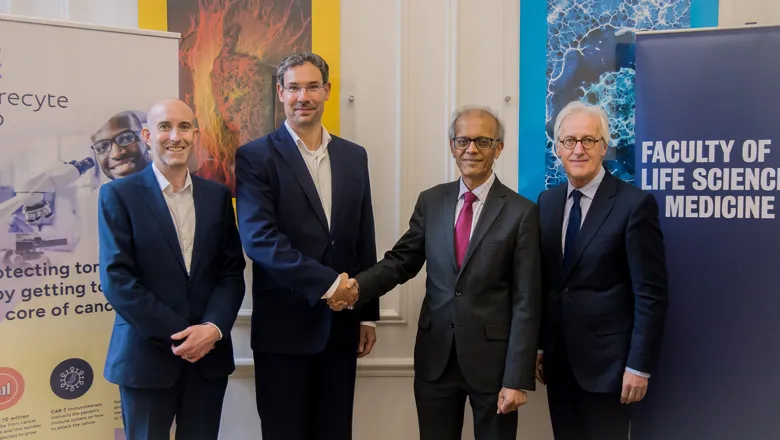The creation of Korecyte Bio is an exciting and essential step in translating Dr Arnold's innovative work into a clinical treatment. It exemplifies our ambitions at King's"
Professor Ajay Shah, Executive Dean of the Faculty of Life Sciences and Medicine
08 January 2024
King's signs commercial contract with cellular immunotherapy startup Korecyte Bio
Korecyte Bio is leading a new approach to CAR T-cell immunotherapy to focus killing potential on cancer cells and reduce toxic side effects to help fight solid tumours.

King’s College London has signed a commercial contract with the new biotech startup Korecyte Bio, a newly formed company seeking to commercialise and translate new CAR-based cellular therapies to clinic to fight solid cancers in patients.
Korecyte Bio’s product is a CAR approach that is based on technology developed at King’s. CAR T-cell therapy is a cutting-edge medical treatment that genetically engineers a cancer patient’s T-cells and ‘trains’ them to target cancer cells using ‘chimeric antigen receptor’ (CARs). While CAR T-cell therapy has revolutionised the way doctors treat certain types of blood cancers, it is evident there are hurdles to effectively using this therapy to fight solid tumours. One major hurdle is tumour selectivity – unless CAR T-cells are engineered to only target tumours, they can mistakenly attack a patient’s healthy organs, triggering potentially lethal toxicities which can limit the maximum safe doses of these cells.
Korecyte Bio’s HypoxiCAR is a new approach to CAR-T immunotherapy. It is a 'living therapy' designed to lay dormant within healthy organs and the blood when given to a patient. The HypoxiCAR T-cells travel throughout the body. When they enter a solid tumour, and sense low oxygen levels associated with the diseased site, HypoxiCAR-T cells respond by switching on a genetic programme to awaken and vigorously attack the cancerous cells. The treatment focuses the killing potential of these cells on the tumour, avoiding cell exhaustion and reducing their activation outside the tumour thereby lowering the toxicity of these therapies, even at high doses, to collectively improve their anti-tumour efficacy. The technology was developed at King’s by Drs James Arnold, Paris Kosti and John Maher in the School of Cancer & Pharmaceutical Sciences. It is modular so could be built into any CAR, or carrier cell, for tackling solid tumours.
This is an exciting step towards translation into a clinical trial for the HypoxiCAR technology, a technology which we hope could eventually be used in a variety of different CARs and carrier immune cells to lower toxicities of these therapies and focus the exquisite and powerful killing potential of the immune system against a patient’s tumour.”
Dr James Arnold, Reader Tumour Immunology at KCL and CSO Korecyte Bio
Established in April 2023, Korecyte Bio is an international company based in both the Netherlands and the United Kingdom co-founded by Dr Léon Spijker’s and Dr James Arnold. Drs Ian Durrant and Melissa Rubock, part of the IP & Licensing team within Innovation@King’s, were key King’s architects behind the contractual route towards commercialisation to allow Korecyte Bio to take forward HypoxiCAR technology to the market.
Korecyte Bio is currently preparing its preclinical data package and manufacturing strategy to include in its first clinical trial application. The team at Korecyte Bio aims to initiate a clinical trial as soon as possible, setting the stage for what HypoxiCAR technology can provide to cancer patients in the future.
We build CAR-based therapeutics that exploit hypoxia, a unifying property of many solid tumours. In the core it is science and technology, but in the heart we are all about people. At Korecyte, we believe this technology combined with our efforts can deliver measurable results that transform lives of cancer patients and their families for the better.”
Dr Léon Spijkers, CEO Korecyte Bio

